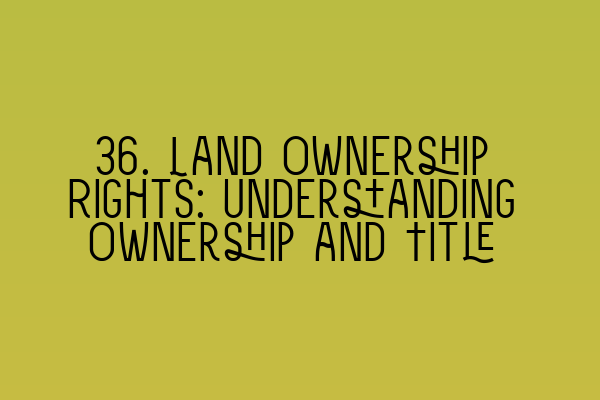36. Land Ownership Rights: Understanding Ownership and Title
Welcome to another informative blog post from SQE Property Law & Land Law! In today’s article, we will be delving into the fascinating topic of land ownership rights and the concept of title. Understanding the intricacies of land ownership is essential for anyone involved in property law, and we aim to provide you with a comprehensive overview that will enhance your knowledge and expertise in this field.
What is Land Ownership?
Land ownership refers to the legal rights and responsibilities an individual or entity has over a piece of land. These rights encompass various aspects, such as the right to possess, use, transfer, and exclude others from the property. In most countries, including the United Kingdom, land ownership is governed by a formal legal system that establishes and protects these rights.
A crucial component of land ownership is the concept of title, which reflects the legal evidence of ownership. Title acts as proof that an individual or organization has the rightful claim to a particular piece of land. It is essential to understand the different types of titles and the legal mechanisms through which they are acquired and transferred.
Types of Titles
1. Freehold Title
A freehold title represents the highest form of land ownership. When an individual holds a freehold title, they have absolute and indefinite ownership rights over the land.
2. Leasehold Title
Leasehold title refers to when a person holds a property under a lease agreement with the freeholder. In this arrangement, the leaseholder has exclusive possession and use of the property for a specified period, known as the lease term.
3. Commonhold Title
Commonhold title is a relatively new concept introduced through legislation. It applies to multi-unit buildings where each unit owner has a freehold title to their individual unit while also sharing ownership of communal areas with other unit owners.
4. Registered Title
Registered title indicates that the information regarding land ownership and any associated interests or rights is recorded and publicly available in a centralized land registry. This system provides transparency and facilitates the smooth transfer of land.
5. Unregistered Title
Unregistered title, on the other hand, means that ownership details are not recorded in a land registry. This type of title often involves older properties and can present challenges when it comes to verifying ownership and resolving disputes.
Acquiring and Transferring Title
There are several methods through which an individual can acquire or transfer land title. These include:
– SQE 1 Practice Exam Questions
– SQE 1 Practice Mocks FLK1 FLK2
– Sale and Purchase: The most common method of acquiring title is through the sale and purchase of property, where the current owner transfers their title to a buyer.
– Inheritance: Title can also be acquired through inheritance when a person passes away, and their property is transferred to the heir or beneficiaries according to their will or the laws of intestacy.
– Gift: Land title can be transferred as a gift, where the owner voluntarily transfers their ownership rights to another person without receiving any consideration in return.
– Adverse Possession: Adverse possession is a legal doctrine that allows a person who has occupied and used a property without the owner’s permission for a specified period to acquire title to that property. However, this is a complex area of law that requires strict adherence to certain criteria.
Conclusion
Understanding land ownership and title is vital for anyone involved in property law. Whether you are a solicitor, a property developer, or an aspiring property expert, knowledge of the different types of titles and the process of acquiring and transferring title is crucial for conducting transactions and resolving disputes effectively.
At SQE Property Law & Land Law, we offer comprehensive training and preparation courses for the SQE 1 and SQE 2 exams, ensuring you have the necessary knowledge and skills to excel in your legal career. Feel free to explore our SQE 1 Preparation Courses and SQE 2 Preparation Courses to enhance your understanding of property law.
If you have any further questions or require legal assistance regarding land ownership or any other property law matters, do not hesitate to contact our team of expert solicitors at SQE Property Law & Land Law. We are here to provide you with professional and reliable advice tailored to your specific needs.
Thank you for taking the time to read this informative blog post. Stay tuned for more engaging content from SQE Property Law & Land Law!
